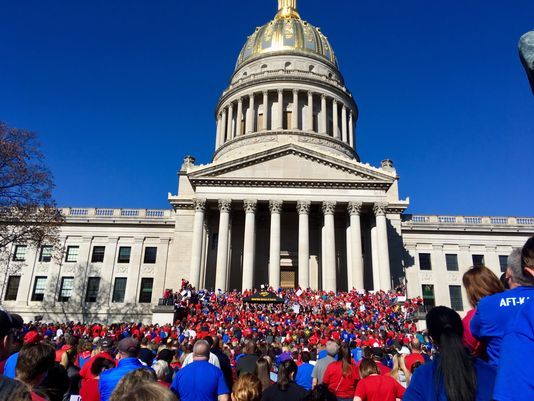Much was made over the past few days that the teacher strike has been unlawful. The attorney general was keen to remind state agencies repeatedly that his office stood ready to pursue legal action against the teachers. To be sure, during the last statewide teacher strike in 1990s, the West Virginia Supreme Court ruled that, because teachers enjoy no collective bargaining rights, they have no right to strike. Yes—they have no rights, because they have no rights. Traditionally, a strike by public employees was viewed as affront to the state’s sovereignty that could threaten public health, safety, and welfare by interrupting vital government services. That argument carries more force with, say, firefighters and law enforcement than teachers, who are not public safety officers, at least not yet. Of course, teachers do perform vital services, indeed, they perform constitutional services to nearly 300,000 children in our state. But that is the very reason why it was shortsighted to view this latest teacher strike as “illegal” in any true sense of the word.
From the moment the attorney general tweeted that the strike “is unlawful and should come to an end” (before it even began), the debate about the teacher strike has been focused on the wrong West Virginia Supreme Court decision. The consequential decision is not the one upholding the common law rule that teacher strikes are, strictly speaking, unlawful but the groundbreaking decision which held that children have a fundamental right to an equitable and adequate education under the West Virginia Constitution. Pauley v. Kelly was the first high court decision in the nation to define the right to education in substantive terms. Among other things, the court determined that the “thorough and efficient” education prescribed by the constitution requires good and competent teachers. Decades of empirical social science research, in fact, confirms that teacher quality is the most influential educational resource affecting student achievement that is entirely within a school’s control.
So, when noncompetitive salaries and benefits, teacher shortages, or the lack of professional development and support cause us to lose quality teachers, those unfavorable conditions, in turn, jeopardize our children’s fundamental right to education. Viewed from that perspective, the teacher strike was no more unlawful than the state’s dereliction of its own constitutional duty. To put things into further perspective, approximately 80% of public school expenditures are for personnel salaries and benefits. It’s not the school building or the textbooks that educate, it’s our teachers. And funding that education, Pauley held, is our state’s first constitutional priority, “ahead of every other State function.” In a footnote the court added, “The patriots of this State were never afflicted with an Appalachian mentality that finds nobility in ignorance.” In that spirit, the teachers who walked the line to provoke greater investment in our children’s education were not deviants engaged in “illegal conduct” but patriots who deserve our utmost respect and gratitude.
